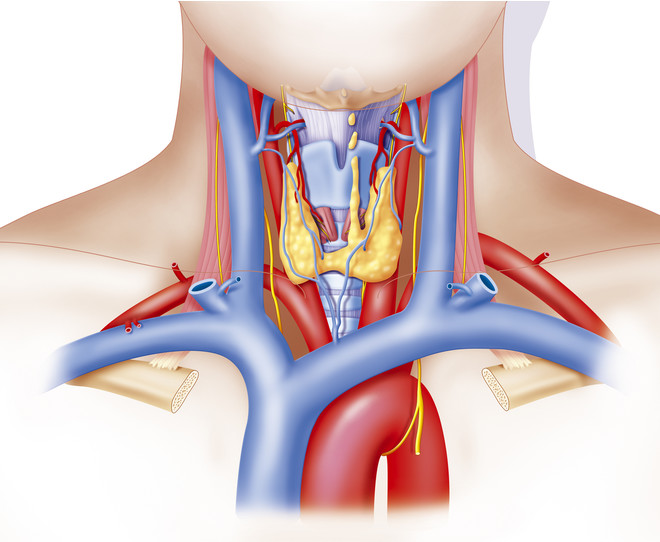Causes of Graves' Disease
It is believed that hormonal imbalance occursdue to autoimmunity. This term refers to an unnatural reaction of the immune system. The body suddenly begins to perceive its own cells as something hostile, and attacks them. But what causes this strange pathology? Graves' disease occurs due to a malfunction of the thyroid gland. Photo: Getty Scientists have identified a number of factors that disrupt the functioning of the thyroid gland. These are:
Graves' disease occurs due to a malfunction of the thyroid gland. Photo: Getty Scientists have identified a number of factors that disrupt the functioning of the thyroid gland. These are:
- hereditary predisposition;
- diabetes;
- dangerous infections;
- nervous breakdowns and depression;
- exposure to radioactive iodine.
Researchers attribute a key role to genetics.But it is still unknown which gene exactly provokes the disease. However, it has been noted that if there were cases of the disease in the family, it is repeated in almost every generation. Women over 20 years of age are most often affected. The risk factor is higher in smokers and people who use iodine-containing drugs.
Symptoms of Graves' Disease
An immune failure causes tissues tothe body is literally poisoned by excess hormones. The person feels constant anxiety, irritability, sleeps poorly at night. Constantly wants to eat, but at the same time steadily loses weight. The patient cannot bear the heat. The further the disease develops, the more pronounced the symptoms:
- chest pain;
- cardiopalmus;
- dyspnea;
- frequent stools;
- weakness of muscles;
- violation of the female cycle;
- thrush;
- bulging eyes;
- double vision in the eyes;
- hair loss.
Without treatment, these symptoms worsen.A goiter, a large tumor, appears on the neck, making it difficult for the person to swallow. A constant cough interferes with talking and sleeping. The eyes become red and watery, bulging from their sockets. The skin on the shins thickens and becomes covered in spots. The patient is emotionally unstable, screaming and crying for no reason.
Basedova's disease in children
For childhood, a softer tone is typical.course of the disease. The main danger is the similarity of the disease with natural adolescent changes. External manifestations are rarely expressed - enlarged eyes and goiter. The child often remains untreated until the symptoms become severe. Dangerous signs are weight loss, increased sweating and excessive nail growth. If the child becomes nervous, does not study well and behaves "strangely" - urgently take him to an endocrinologist. In the early stages, drugs are prescribed that suppress the thyroid gland. Usually, after 2 months of therapy, the child's condition improves dramatically. In more complex cases, radioactive iodine is prescribed for a course of 3-6 months. If nodes are found in the thyroid gland, surgery is required to remove part of the gland. Graves' disease is a lifelong condition. But timely medical care, proper nutrition and physical activity help to achieve a normal quality of life. Read also:









